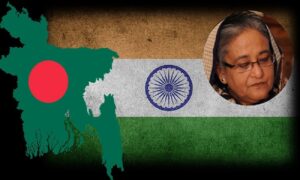Political rise of Bangladesh, diplomatic challenge for India
Bangladesh’s political rise will have significant diplomatic and strategic implications for India, policymakers in that country believe. According to them, the sudden change in politics in Bangladesh could affect the long-standing friendly relations between the two countries.
With the ouster of Sheikh Hasina, known as India’s staunch ally, New Delhi faces complex challenges in navigating the political landscape in neighboring countries.
During Sheikh Hasina’s tenure in power, Bangladesh’s bilateral relations with India have continued to grow. Despite the rise of Hindutva forces in India, friendly relations between the two countries remained strong through mutual interests in energy, infrastructure and security.
Bangladesh has seen ‘significant’ economic growth and development under Hasina’s leadership. His policies were of utmost importance in the infrastructure, healthcare and power sectors, which created numerous opportunities for India to cooperate. The two countries have closely cooperated in counter-terrorism efforts, intelligence and conducting joint operations to combat active extremist groups. Sheikh Hasina’s sudden ouster has shocked New Delhi’s diplomatic corridors.
Bangladesh’s new government, which is expected to be heavily influenced by religious fundamentalists close to India, poses a direct challenge to strategic interests. India’s media reported that ‘Delhi-Dhaka relations will recede in recent years’, hinting that Islamist parties will play an important role in the new administration.
India’s Ministry of External Affairs has so far maintained a cautious stance, identifying the sudden political change in Bangladesh as an internal matter. However, analysts believe that the ‘possible rise of religious extremism’ in Bangladesh could become a headache for India.
According to critics, India missed an opportunity to intervene diplomatically during Sheikh Hasina’s political crisis. Despite diplomatic ties and strategic importance to Bangladesh, the NDA government opted for a ‘hands-off’ approach. India’s decision stands in stark contrast to the actions of other global powers like the United States, which has openly criticized the electoral process in Bangladesh and supported the opposition movement.
Peter Haas, the former US ambassador to Bangladesh, has publicly questioned the transparency of recent elections and applied international pressure on the Hasina administration. In contrast, India’s silence is seen as a sign of ‘diplomatic passivity’, ie Delhi’s active withdrawal during the crisis in Bangladesh.
India’s role in the formation of Bangladesh is a testament to the deep ties between the two countries. According to Indians, during the Liberation War of 1971, India provided important military and humanitarian assistance leading to the creation of Bangladesh! This intervention cemented friendly relations that still endure through the different political regimes of both countries.
After the tragic assassination of Bangabandhu Sheikh Mujibur Rahman in 1975, Sheikh Hasina’s relationship with India became stronger. India even gave shelter to Hasina and her family who were in Germany during the coup. Sheikh Hasina continued her political activities from Pandara Road in Delhi till 1981 and maintained strong relations with Indian leaders. This engagement underscored the mutual trust and cooperation that characterized Indo-Bangladesh relations during Hasina’s tenure.
Bangladesh’s current political uncertainty threatens to disrupt economic cooperation in recent years. Projects in energy, infrastructure and healthcare, which were initiated under Hasina’s government, are likely to be delayed or cancelled. Indian companies investing in the sector are currently on hold pending clarity on the new government’s policies, while security is another major concern for New Delhi, which could hamper ongoing counter-terrorism efforts given the influence of religious fundamentalists in the new government.
Bangladesh is an important partner in countering extremist groups that threaten regional stability. A change in the political landscape could embolden these groups, leading to an increase in cross-border terrorism and deterioration of the security situation along the India-Bangladesh border, political analysts believe.
Despite multiple assassination attempts, political imprisonment and criticism at various times, Sheikh Hasina remains a formidable leader to India. Hasina’s government’s initiative to provide shelter to Rohingya refugees, improve healthcare and focus on women’s empowerment has earned her international recognition. However, his tenure was not without controversy. Allegations of electoral fraud, repression of political opponents and fascist practices have drawn criticism from various quarters.
The Hasina government is suppressing Bangladesh Nationalist Party (BNP) opposition leader Khaleda Zia under house arrest and filing more than 400,000 cases against opposition party members. These actions have tarnished Hasina’s democratic credentials.
As Bangladesh transitions to a new government, India must carefully navigate diplomatic relations with its neighbour. A delicate balance will be required to engage with the new administration to assert India’s strategic interests while respecting Bangladesh’s sovereignty.
India’s diplomatic strategy should be multi-pronged, involving dialogue, economic incentives and regional cooperation. Building trust and ensuring continuity of bilateral projects should be a priority.
Strengthening people-to-people ties, promoting cultural exchanges and enhancing trade relations can provide a stable basis for future cooperation. Additionally, India must remain vigilant in addressing security concerns, ensuring that counter-terrorism efforts remain effective despite political changes in Dhaka.
The political rise of Bangladesh presents an important diplomatic challenge for India. The ouster of trusted ally Sheikh Hasina and the rise of a new government could disrupt progress in bilateral relations. Navigating this complex situation will test India’s cautious approach and historical relationship with Bangladesh.
The future of India-Bangladesh relations will depend on New Delhi’s ability to adapt its diplomatic strategy to the evolving political landscape in order to protect mutual interests and maintain regional stability.
Source: The Star





